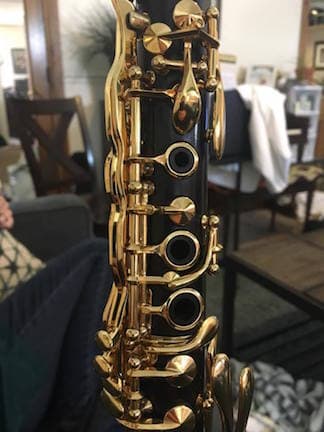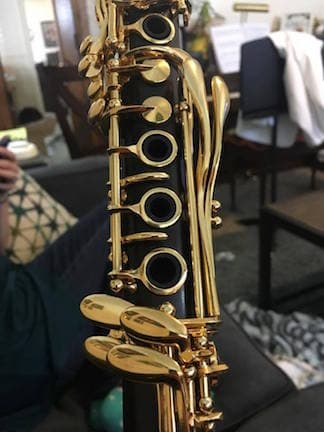
Curated with aloha by
Ted Mooney, P.E. RET

The authoritative public forum
for Metal Finishing 1989-2025

Thread 603/52
Acid vs Cyanide gold plating solutions
Q. I am planning to gold plate a set of nickel plated clarinet keys. I am looking to apply a hard, thick gold plating that will wear well in this application. Which type of gold plating solution would be best for this project? Thanks.

John Talcott
band instrument repair - Springville, Utah, USA
January 16, 2017
publicly reply to John Talcott
A. There are many gold plating formulations which can meet your requirements.
I'd probably use an acid gold with a bit of nickel or cobalt.
Contact the suppliers of gold plating processes. They will steer you in the right direction.
But ... to do yourself a handful of keys is probably neither economically nor technically wise. You'll likely spend too much money and do a poor job.
Find a good plating shop which will do them better and cheaper than an inexperienced hobbyist can.

Jeffrey Holmes, CEF
Spartanburg, South Carolina
January 17, 2017
publicly reply to Jeffrey Holmes, CEF
A. Hi. Jeffrey's advice is good from start to finish. But the one modifier I would add is that there are many artists and hobbyists who want to learn to do plating; for them, gold plating of small items which are already nicely nickel plated can be a good starting point because 'prepping' the metal is the hard part, and that's already been done.
On the other hand, experience is the best teacher, and gold at $1000+ per ounce is an awfully expensive teacher.
Regards,

Ted Mooney, P.E. RET
Striving to live Aloha
finishing.com - Pine Beach, New Jersey
January 2017
publicly reply to Ted Mooney
![]() Thank you Ted for your understanding. I am a trained band instrument repair technician who prides himself on attention to detail and research before beginning a new project. The point of my original question was to find out the advantages and disadvantages of acid based gold plating solutions compared to those that are cyanide based. Since I already have the necessary equipment, to buy the required amount of gold solution is less than half the amount estimated by professional platers to do the job. Since I am doing this for a friend I am not charging for the labor.
Thank you Ted for your understanding. I am a trained band instrument repair technician who prides himself on attention to detail and research before beginning a new project. The point of my original question was to find out the advantages and disadvantages of acid based gold plating solutions compared to those that are cyanide based. Since I already have the necessary equipment, to buy the required amount of gold solution is less than half the amount estimated by professional platers to do the job. Since I am doing this for a friend I am not charging for the labor.

John Talcott
band instrument repair - Springville, Utah, USA
January 18, 2017
publicly reply to John Talcott
by Reid & Goldie
-- hard to find & expensive; if you see a copy cheap, act fast!

on eBay or
AbeBooks
or Amazon
(affil links)
A. Hi John. You can try a library for Goldie's "Gold Plating Technology".
... and after repeatedly thumbing through its excellent 630 pages, you'll still have the same question "acid gold vs. cyanide gold?" -- at least I do :-)
The same with other books that talk about gold plating. The problem is that gold plating has been around for 170 years, and is very technically pliable, so that just about anything you can achieve with alkaline cyanide gold you can do with acid gold and vice versa. Although most acid gold is still cyanide based, there is less cyanide so it's probably somewhat safer to work with. It's probably somewhat easier to incorporate the nickel or cobalt alloying material for hardening the deposit. As mentioned, I'm confident that Jeffrey's advice is good. The downside of acid gold would be that your anodes need to be platinized titanium rather than stainless steel, which adds expense.
You may realize this, but for the benefit of other readers, you don't formulate gold plating solutions, you buy them.
Regards,

Ted Mooney, P.E. RET
Striving to live Aloha
finishing.com - Pine Beach, New Jersey
January 2017
publicly reply to Ted Mooney
![]() Thanks again for the advice. I found a local supplier for 24K hard gold solution who was very helpful in providing technical help. The gold plated clarinet keys turned out beautiful.
Thanks again for the advice. I found a local supplier for 24K hard gold solution who was very helpful in providing technical help. The gold plated clarinet keys turned out beautiful.



John Talcott
band instrument repair - Springville, Utah, USA
March 27, 2017
publicly reply to John Talcott
A. Hi John
If Ted had not posted this as two separate questions ...
One more point.
If the keys are already nickel plated, the nickel will require an activation process before gold plating or you will have severe adhesion problems. It is often more efficient to strip the nickel and replate.
Nice instruments !

Geoff Smith
Hampshire, England
March 28, 2017
publicly reply to Geoff Smith
March 28, 2017
Q. Prior to gold plating the clarinet keys that were previously nickel plated, we did an electrocleaning, and then an "acid" dip as directed by the manufacturer of the gold plating solution. I hope this is what is meant by "activation process".


John Talcott
band instrument repair - Springville, Utah, USA
publicly reply to John Talcott
A. Hi John. Time will tell, but it's certainly entirely possible, even likely, that all will be just fine.
For the benefit of other readers, and perhaps the future, what Geoff is referring to is that nickel quickly tarnishes/oxidizes/passivates, and removing that oxidation so that excellent adhesion can be obtained is more than a simple acid dip can do. The usual activation is via a Wood's Nickel Strike and even that may not be 100% on really old nickel.
But on the plus side is that the gold plating is not nearly the thickness of some other platings; the keys are small, not vast expanses of stressed plating; you probably sanded away any areas of really dark and thick tarnish; and (probably most importantly) these keys will not be exposed to extreme thermal cycling like some soldered electronic components are.
Luck & Regards,

Ted Mooney, P.E. RET
Striving to live Aloha
finishing.com - Pine Beach, New Jersey
publicly reply to Ted Mooney
Q, A, or Comment on THIS thread -or- Start a NEW Thread